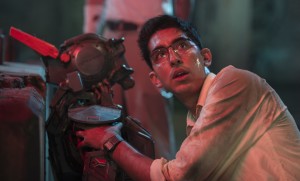From the director of “District 9” and “Elysium” comes Neill Blomkamp’s latest sci-fi action thriller called “Chappie.” Our own J.P. gives his take on the film.
“CHAPPIE”
Columbia Pictures
Opened: Friday, March 6, 2015
Rated R by the MPAA for the following reasons: violence, language and brief nudity
Running Time: 124 minutes
Starring: Sharlto Copley, Dev Patel, Jose Pablo Cantillo, Sigourney Weaver, Hugh Jackman, Ninja, and Yolandi Visser
Directed by: Neill Blomkamp
Produced by: Simon Kinberg
Screenplay by: Neill Blomkamp, Terri Tatchell
Based on “Tetra Vaal” by Neill Blomkamp
Studio Synopsis:
In the near future, crime is patrolled by an oppressive mechanized police force. But now, the people are fighting back. When one police droid, Chappie, is stolen and given new programming, he becomes the first robot with the ability to think and feel for himself. As powerful, destructive forces start to see Chappie as a danger to mankind and order, they will stop at nothing to maintain the status quo and ensure that Chappie is the last of his kind.
J.P.’s Take:
“Chappie” is Neill Blomkamp’s third sci-fi outing, fitted with yet another socially conscious backbone.

Blomkamp and writing partner/wife Terri Tatchell explore the age-old concept of sentient machines, where the question arises – can robots develop an enlightened sense of self? Further, once they reach enlightenment, will they be the savior of humanity? Questions that are better handled in other well-known entities as “Robocop,” “Blade Runner,” and “I,Robot.”
Instead of focusing on a central idea, Blomkamp and Tatchell chose to piecemeal classic sci-fi trope, with abstractions of classism and social injustices. Unfortunately, the hodge podge execution of ideas ultimately becomes the film’s undoing, as the messages get lost in the shuffle. With those points aside, we homed in on the title character himself. Blomkamp humanizes Chappie (voiced by Sharlto Copley) giving him childlike sensibilities, allowing viewers to connect with him on a basic level. The issue is Chappie isn’t emotionally sophisticated enough to handle the moral dilemmas he’s placed in. His responses to his environment are like a kid with A.D.H.D with no realistic tone to his actions.
The atmosphere doesn’t seem quite right here as well. Chappie lives within a dysfunctional family, in which his mother Yolandi (Yolandi Visser playing herself) and father Ninja (playing himself) try to instill in him lessons about the harsh world. Clearly, we see he’s being neglected and abused by his thuggish parents, as Ninja grooms him to become a criminal. These scenes are played up for laughs when, obviously, they are cringe-inducing moments. If Blomkamp/Tatchell were actually trying to pose a social statement about child abuse, I believe here they missed the mark. The only real heartbreaking instances come from scenes where street kids are stoning Chappie, or when Vincent Moore (Hugh Jackman) severs his arm. Scared, alone and injured he makes his way back home where his mother nurses him back to health. Luckily, they can just replace his arm, as though they were repairing a copier machine.

Character development suffers from flat writing, as the human characters are devoid of any real emotions as well. This leaves the story stalled.
It would seem a waste of Sigourney Weaver’s talent to place in the role of Tetravaal CEO Michelle Bradley. She’s given little to do except bark orders or look flustered in times of crisis. Jackman would have done better revising his role as Wolverine than, in the antagonistic role of Vincent Moore. Minus the claws, at least, he could have been a lot more vicious and sharp witted then. Here, he is cartoonishly presented.
Dev Patel weighs in as the genius robotics engineer Deon Wilson, whose intentions are morally sound. Yolandi and Ninja, who make up the rap/rave/punk band Die Antwoord, are featured prominently in this movie, as their roles almost become self-contained advertisement for the group. The fact that Blomkamp is a huge fan of their’s could be the reason for him dialing back Weaver’s and Jackman’s roles.
“Chappie,” unfortunately, plummets into violent videogame trappings as it ends in a blaze of gunfire and explosions. Although I didn’t hate this film, I felt many of the social commentaries could have been solidified. Or, at least, they could have transplanted them into future productions. The rehashed intelligent machine trope could have also been strengthened; pushing the boundaries of how truly emotional and brainy these robots can be. Instead, this film brought nothing fresh to the genre.
